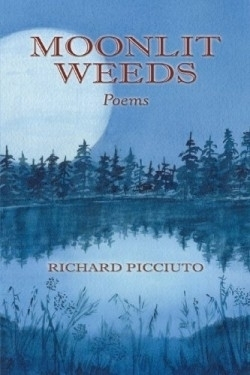
Moonlit Weeds
Richard Picciuto’s poetry collection, Moonlit Weeds, is full of quiet yet extraordinary images. This collection is diverse: There are poems about first crushes and cigarettes and others that delve into the mysticism of silence. Picciuto examines his personal history and plucks the moments that formed him. With the moon’s light, even weeds take on a translucent and otherworldly light.
Using a wide array of poetic forms, Picciuto keeps readers on their toes. The line lengths vary, and Picciuto knows how to break a line for meaning as well as for sound. The best lines in the collection are those that contain action. For example, in the dense poem, “Steamboat,” the pace mimics a ski lift: “fifteen hundred feet higher than mid-mountain. Waiting for the lift / I scanned the white ribbon runs of the mountain. While riding.”
Picciuto often tries to sum up too much in the final lines of the poems. “Mowing the Grass at Age Eight” is evocative because the poem takes a mundane task and makes it magical. However, after lines of glorious detail, Picciuto dulls the edge of the poem by explaining the memory. He writes, “When I see or hear power mowers now, I think / of how irritated he would be when they get near his grave and / they don’t clip around his headstone.” With some trimming, these weeds could have been sliced clean, placing the focus of the poems on rich images rather than explanation.
Some of the poems in this collection read more like journal entries or newspaper articles than poems. For example, “Paranoia” has a solid premise—the fear a writer has when writing about loved ones’ private events. However, the final stanza offers little resolution. Picciuto writes, “but my parents are both dead and I don’t think my children / will sue or kill me. I’m guessing most of the others won’t find out, / yet still I think I may sign this anonymous or start using a pen name.” This stanza reads like a thesis statement.
Picciuto begins the second section of the book with a Rita Dove quotation: “all of us have moments in our childhood / where we come alive for the first time.” The poems in Moonlit Weeds mark such moments. They show a world where people look at “a land of dreams,” one that is “so beautiful, so various, and so new.” All that is certain is that the weeds exist, the sun will shine, and life’s shining moments revolve around “a breath / of ecstasy and a song of peace” even as “the passionless chant / like insects in the moonlit weeds.”
Disclosure: This article is not an endorsement, but a review. The publisher of this book provided free copies of the book and paid a small fee to have their book reviewed by a professional reviewer. Foreword Reviews and Clarion Reviews make no guarantee that the publisher will receive a positive review. Foreword Magazine, Inc. is disclosing this in accordance with the Federal Trade Commission’s 16 CFR, Part 255.
